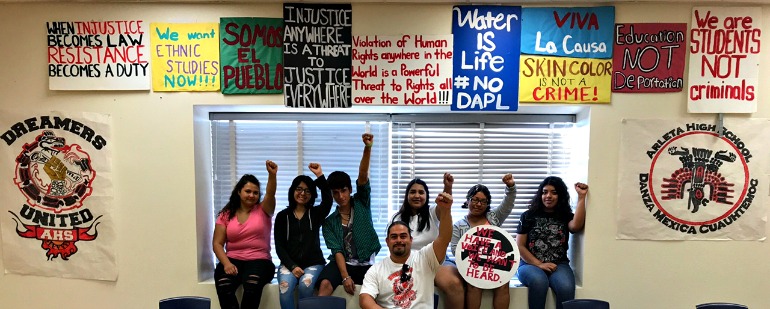Ethnic Studies courses examine race and ethnicity while still highlighting the complex phenomenon of sexuality, gender, and the history of different minorities in the United States. It is 2017 and the history that is predominantly implemented in K-12 curricula is one that solely emphasizes that of the white American. If that is all students are being exposed to, their lack of engagement and interest is bound to be present – at least mine was.
It was not until I took Chicana/o Studies courses, that I felt like I belonged somewhere. It is safe to say that these courses helped me become a better person in general. These are a couple of reasons why we need Ethnic Studies courses:
1. Students do better academically if they feel that they are reflected in the curriculum.
The traditional K-12 curricula across the nation tend to exclude the history of black and colored folk. In Tucson, Arizona, Mexican-American studies programs were implemented in order to enhance students’ academic performance. Roque Planas emphasizes in his article, Banned Mexican-American Studies Curriculum Boosted Student Achievement: Study, that students who took these courses “outperformed” their peers who did not take the courses. Planas also highlights how the American Educational Research Journal found that students who took these courses also had higher graduation rates. It is evident that if students know their history, they will do better – the research speaks for itself. Despite the evidence, the Tucson District eradicated these courses. The action to eliminate Mexican American Studies courses that ameliorate student success shows what petrifies the establishment, in this case, educated Chicana/os.
The access of Chicana/o Studies courses has helped me as a student. In other words, I’m doing better in college than I was doing in high school and that’s because I feel reflected in the curriculum – something I never felt in any of my high school courses.
2. Students learn to deconstruct internalized ideas of unworthiness.
The traditional high school curriculum is very Eurocentric and the history is Anglo-American based. This form of exclusion, unfortunately, limits students to what they are truly capable of, thus creating a sense of belittlement within themselves. As a student in college, I can attest to this. A college environment can be brutal, especially for first-generation students. You quickly become aware that some spaces were not meant for poor brown folk like you. These courses allow you to have a space. A space that you did not think existed. In an article, “Why Ethnic Studies Courses are Good for California, and America”, Professor Noah Remnick stresses that “the NEA review of research cites multiple university studies showing that, for students of color, the more they know about race, racism and cultural identity, the higher their grades and graduation rates, and more likely they are to go on to college.” The first Chicana/o Studies course I took helped me feel worthy of being at CSUN; it helped me feel engaged in my education for the first time and I was owning that.
3. These courses will help students become empowered.
Ethnic Studies courses will not only help students excel in the classroom, but it will empower students to attack issues in society that negatively affect them. These courses will help students become politically and socially aware of the injustices in our communities. It is evident that we are not a post racial society, and courses like Chicana/o Studies would help students acknowledge the institutional racism in the educational systems. Imagine reading literature or hearing your professor’s lecture and literally getting chills? That’s how I feel in my Chicana/o Studies courses!
In the first Chicana/o Studies course I took, the professor would regularly assign readings and one of those readings happened to be Sandra Cisneros’ Guadalupe the Sex Goddess. I’ve never felt so empowered reading anything. I was no longer ashamed of identifying as a chingona. I was able to embrace my brownness and realize something, I enjoyed writing. And that is what empowerment for me felt like.
Rocio Rivera-Murillo
Latest posts by Rocio Rivera-Murillo (see all)
- ¿Por Qué es Tan Difícil ir a la Universidad para un Estudiante de Primera Generación? - November 7, 2017
- Why It Is So Hard to Be a First Generation College Student? - October 24, 2017
- Tres Razones por las que Necesitamos Estudios Étnicos - August 31, 2017
- Three Reasons Why We NEED Ethnic Studies Courses - August 30, 2017
- Por qué Debe Crear un Espacio para Chequeos de Salud Mental - August 28, 2017

